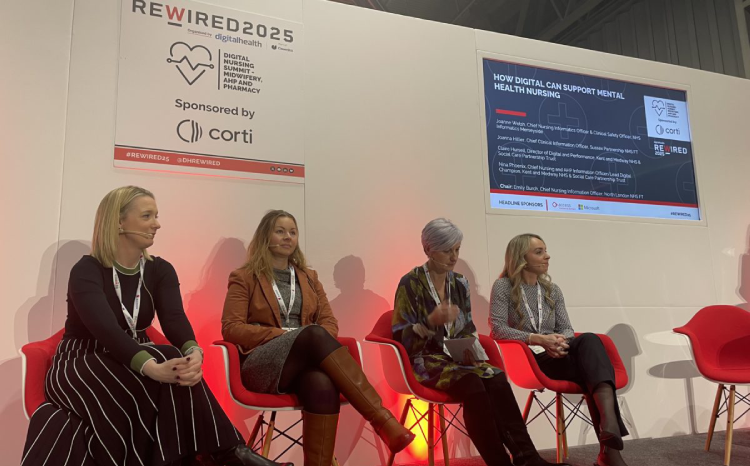E-Health Innovation awards honour primary care
- 21 April 2005
Primary care IT developments were well represented among the winners of the first E-Health Innovation Awards 2005.
Projects that help diabetic patients, support and improve the allied health professions’ community services and streamline booking for GP appointments were among the winners who stepped up to receive their trophies.
The awards, organised by Intellect and E-Health Insider, have been designed to highlight the application and use of innovative ICT solutions in the UK healthcare sector and reward the partnership approach of the public and private sector in delivering benefits to the patient.
Linda Davidson of E-Health Insider who was a judge for the awards said: “The winners show what can be achieved when health professionals, managers and suppliers harness IT to improve services, increase efficiency and empower patients. It’s been a great privilege to meet all the finalists – not just the winners. They are really showing the way for everyone in healthcare.”
John Higgins, Director General of Intellect commented: “Technology plays a vital enabling role in the modernisation of the healthcare service and in the delivery of improved patient care. The awards were developed because the industry believed it was important to start recognising and rewarding the brightest and best work in UK healthcare information technology.”
“The six winners of the inaugural E-Health Innovation Awards are shining examples of best practice work in Healthcare IT, and demonstrate just how much can be achieved when an effective partnership approach is adopted between the public and private sector.”
The winners are:
Best use of e-health to deliver integrated care
Sponsored by Centrom
Implementing an electronic patient record system for allied health professionals working in the community
Ethical Technology Ltd (Ethitec), Charnwood and NW Leicestershire PCT and Leicestershire Health Informatics Service
Everyone bemoans the fact that the allied health professions are poorly served by information technology in the NHS, but our winners actually worked together to do something about this. Their implementation of Ethitec’s Tiara system has improved communication between professionals when they are treating the same patient and transformed the appointments system to the point where, for example, the podiatry waiting list is now virtually zero.
Best use of e-health to improve efficiency
Sponsored by Xerox Global Services
Increasing efficiency in radiology through PACS and speech recognition
Northern Lincolnshire and Goole NHS Trust and Philips Speech Recognition Systems
A chronic shortage of radiology secretaries sparked interest in the use of speech recognition technology to aid workflow at the Diana Princess of Wales Hospital, Goole. Since then other radiologists led by consultant, Dr Richard Harries, have converted to the technology. A new picture archiving and communication system arrived last year and the combined effect of the two technologies – plus a great deal of human effort – has seen the average time from examination to report authorisation drop from 17.66 days to 4.56 days – an efficiency increase of 74%.
Best use of mobile technology
Sponsored by Cisco Systems
‘Blackberry Transplant’
University of Cambridge Hospitals NHS Foundation Trust
Transplant co-ordinators at Addenbrooke’s Hospital’s famous transplant centre used to carry around 200 A4 sheets of information – some of it out of date – about patients waiting for new organs. A switch to handheld Blackberry devices, linked to a central server, now enables the co-ordinators to access or update the records instantly. As renal transplant co-ordinator, Paul Jones, explained: “When we are on-call we need rapid access to up-to-date information. Though this could be done using the paper-based systems, it’s a great benefit to have wider and more up-to-date information readily accessible.”
Most innovative e-health product
Joint winners, sponsored by InterSystems
EMIS Access
EMIS
EMIS Access allows patients to view. book and cancel appointments through a secure website. Practices choose which of their surgeries appear online. When appointments are booked their clinical systems are updated immediately to prevent double booking. In addition, a pilot in South Yorkshire is offering patients the option of booking via a digital television set using the remote control. EMIS estimates that if just 10% of UK appointments were booked using the system the NHS would save £14.6 million.
Historian – automated psychiatric history taking on the internet
North East London Mental Health Trust
Automated history taking is not new but the innovative approach taken by Historian, devised by Dr Jason Taylor, is. The program enables histories to be taken in more than 15 languages, including many that are common among refugees, and offers English output to the assessing professional. The system enables patients to complete the history at home and helps professionals to appraise psychiatric referrals rapidly and prioritise services.
Best use of e-health to empower patients
Sponsored by iSOFT
t+ for diabetes monitoring
e-San Ltd
t+Diabetes is a new way of recording healthcare data and providing real-time personalised feedback over a mobile phone to people with diabetes. The development version of the t+ product has been tested in a randomised controlled trial run by Oxford University’s department of public health and primary care. The trial showed a significant positive influence on glycaemic control for the group using the product. The outcomes were achieved as a result of high compliance in the group using t+ and the key features of the system: real-time feedback and support from nurses when abnormal readings were picked up.





